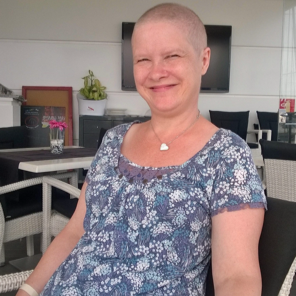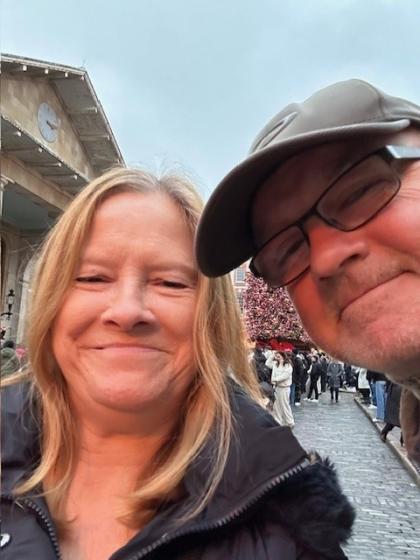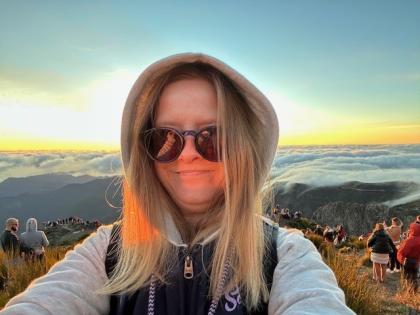Judy's story
In November 2014 I was diagnosed with stage 3C ovarian cancer at the age of 48. With no known cancer in my family this diagnosis came as a complete shock.
My diagnosis and treatment
For several months prior I'd been experiencing symptoms, in particular severe abdominal pain and bloating. Since I'd suffered with irritable bowel syndrome intermittently for around 30 years, I assumed that my symptoms were caused by this condition.
I eventually went to see my GP who did some tests and an examination. She couldn’t find anything obvious but as a precaution sent me for a scan because of the pain I was in. A week later a mass was discovered on one of my ovaries.
I was referred to a Consultant at my local hospital who arranged a CA125 test, which was 1,798 against the normal level of 35 (or under). I then had a scan and a biopsy, following which came the full diagnoses the week before Christmas 2014.
My treatment started shortly afterwards with 12 weekly chemotherapy sessions designed to reduce the tumour, which was also attached to my bowel.

On 15 May 2015 I had a radical hysterectomy, followed by 6 further chemotherapy sessions. I was looked after magnificently by all the amazing NHS professionals who literally saved my life.
I was completely exhausted throughout the chemotherapy, in particular post surgery when I lost my hair for the second time in 9 months. Recovery from major abdominal surgery was slow at first, and it was nearly a year before I felt totally comfortable again.
After my surgery I was thrown into surgical menopause, but it didn’t affect me at the time as I was dealing with the bigger challenge of recovery. I do still have hot flushes 10 years later, but it's a small price to pay. I'm unable to take HRT due to my higher risk of further related cancers.
Support during my illness
I was very fortunate that my line manager and the company I worked for were very supportive, both personally and financially - I was thankful to receive full pay throughout the 12 months I was being treated.
My husband Jon was a tower of strength for me and my son Matt, who was only nine years old at the time of my diagnosis. Jon was instrumental in keeping the household running smoothly, whilst also working full time in a high pressured job.
As a family we had a huge amount of support, especially from my parents and closest friends. I always had a volunteer to sit with me during my chemo sessions, or keep me company when I was feeling low. I was also able to attend The Mustard Tree Centre in my local hospital through which I attended workshops, seminars and PT sessions.
I was determined to stay positive, and having a young child in the household massively helped with this. I didn’t want my son to see me scared or upset.
We spent many happy hours watching films together in the evenings when I was too tired to do anything else. When he was in year 5/6 he would often come home from school at lunchtime to make sure I was ok, and to feed our cats.
There were many humorous moments along the way. I'll never forget my sons face when I told him that my hair would grow back – he had no idea and assumed I'd be bald forever! Or, when he calmly said "wait - am I the only one in this family with hair?!"
My parents supported me every step of the way too, and I was always in their prayers. My mum often reminded me of a verse from the bible ‘A merry heart doeth good like medicine, but a broken spirit dries the bones.'

Follow up and monitoring
After my treatment was completed, I had regular 6 monthly blood tests and check ups with my oncologist, and this still continues ten years on. Due to the nature of my cancer I'm at a higher risk of getting breast cancer, so I have annual mammograms and MRIs as well.
I've been taking Tamoxifen for several years now, which is known to reduce the risk of breast cancer. This does mean that I'm unable to take HRT, but on the plus side I feel that if there was a recurrence, there's a good chance it would be caught at an early stage.
More education is needed
Before my diagnosis, I'd never heard of ovarian cancer. I'd always attended my regular cervical screening tests, and had just had my first mammogram. I wasn't made aware of any other ‘female’ cancers by the medical professionals I came into contact with.
Since my diagnosis, I have known of six other women with ovarian cancer, and all have sadly died. These have been family friends or ladies that I've been introduced to through friends in my town.
I feel very strongly that there should be much more education and literature available. In particular I find it disappointing that I’ve never seen so much as a poster about ovarian cancer at any of the waiting rooms I have sat in.
Breast and cervical screening appointments represent such a good opportunity to inform women about all gynaecological cancers and I would love for this to become the norm.

Getting involved with Target Ovarian Cancer
Whilst I was having treatment, myself and my younger sister organised a couple of fundraising events. I held a Pampered Chef party raising £400, and my sister had her beautiful long hair cut very short, raising over £1,000 for Target Ovarian Cancer. After my surgery and additional chemotherapy I was happy to be rid of the disease and wanted to concentrate on my family.
However, on the day of the 10th anniversary of my diagnosis, feeling both emotional and incredibly thankful, I found I wanted to reach out to Target Ovarian Cancer once again!
I'm retiring at the end of May, and I’m very keen to use some of the extra time I’ll have on my hands to support Target Ovarian Cancer. I know I’ll get a real sense of purpose from supporting the charity – helping to raise awareness, campaigning and fundraising; and being in touch with other women who've been diagnosed with this disease.
I'm hoping that sharing my story will positively encourage anyone who might be struggling to find a little light in their dark times.
I've already joined the online Facebook community group, ordered some literature to distribute, and been in touch with my MP. My area of South West Cornwall falls in the Peninsular Cancer Alliance which covers Cornwall, Devon and Dorset. In this region only 28% of ovarian cancer cases are diagnosed at stage 1 or 2, when outcomes are likely to be better.
I feel incredibly fortunate to be here today. In 2014, I was told that my chances of surviving five years were just 20%. One decade on, here I am, living a full, healthy life.
If you’ve been affected by this story and would like to speak to a specialist nurse, you can call our free support line on 0808 802 6000 or contact us: [email protected]. We're open from 9am until 5pm, Monday to Friday.
Legal Disclaimer:
EIN Presswire provides this news content "as is" without warranty of any kind. We do not accept any responsibility or liability for the accuracy, content, images, videos, licenses, completeness, legality, or reliability of the information contained in this article. If you have any complaints or copyright issues related to this article, kindly contact the author above.
